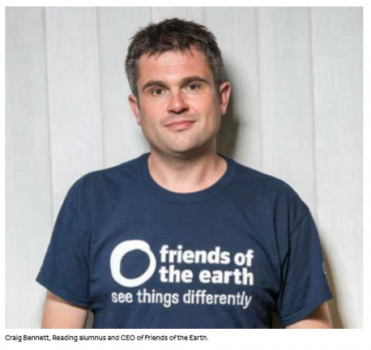Update January 2021: Craig Bennett has since become CEO of The WildLife Trusts
Not long ago, the University found out more about what motivates Craig Bennett, Chief Executive Officer of Friends of the Earth, how he made his way into his green career and how his time at the University of Reading inspired him. What better time than Green Festival to share what we discovered and we hope you will now feel inspired too…
Then a teenager and technical “whizz kid” seemingly destined for a career in computing, a chance viewing of an episode of Question Time proved the catalyst in convincing Craig of an early change in direction, that would ultimately lead him to become one of the world’s top environmental campaigners as Chief Executive Officer of Friends of the Earth.
“I remember watching Question Time late one night as a 14-year-old, which was a very sad thing for a 14-year-old to have been doing,” the human and physical geography graduate told Connected, explaining there was nothing otherwise remarkable about his childhood in south Essex – “classic M25 territory” – or his parents who “were not granola-eating, rock climbers”.
Jonathon Porritt, the Director of Friends of the Earth at the time, was on the panel and he was the only person making any sense, so I joined Friends of the Earth the next day and got involved with my local group the following week.
“I could see back then the madness of a linear system based on mining resources, using them and dumping them,” added Craig, whose CV includes a spell as co-director of the Prince of Wales’s Corporate Leaders Group on Climate Change.
“I knew this wasn’t progress – just humanity doing something that was not useful long term.
“There is still so much we don’t know, but the more we discover of the richness of this natural world, the more we come to really appreciate what a wondrous planet we live on and how stupid it is for humanity to be trashing it before we even fully understand it.”
A desire to mine as much knowledge as possible about how the physical world interacts with human geography was key to the 46-year old’s decision to study at Reading and has led to an enduring relationship with the University.
Craig, who is Honorary Professor of Sustainability and Innovation at the University of Manchester’s Alliance Manchester Business School, returned to deliver a lecture exploring the evolution of the concept of “progress” earlier this year, and Friends of the Earth worked closely with Professor Simon Potts to ensure it was equipped with the necessary science and evidence to support its campaign to protect wild solitary bees.
“Higher education has a critically important role to play in our futures and I’ve been really concerned about where some of the debate on the sector has gone in the past few years,” he said. “The argument that graduates earn more and can, therefore, afford to pay tuition fees and take out student loans implies the only reason people go to university is to affect their future earnings, and that is completely missing the point.
“The whole of society benefits from having young people with a really good education, who have had their minds opened to new ideas and learned how to think critically.”
Such attributes, combined with Reading’s ground-breaking research in the fields of geography and environmental science, will be vital to convincing climate change-sceptics of the errors of the past, he added.
“That there are those resisting change is nothing new and is true of any big social change in history,” said Craig, who was appointed CEO of Friends of the Earth in 2015 following a five-year tenure as Director of Policy and Campaigns at the environmental charity.
“Just as there were dissenting voices when people were campaigning for the abolition of slavery, or for universal women’s suffrage, there are now people arguing against action on climate change or putting plastics in our oceans.
“We will get there eventually. However, unlike slavery or women’s suffrage, we have a ticking clock and the longer we take to work out how to live fairly with environmental limits, the smaller the prize at the end of it. The beauty of the natural world and real value of the planet on which we live are being eroded all the time.”
Citing Friends of the Earth’s grassroots footprint and global network as its greatest strength, Craig concluded: “Friendships, connections and communities coming together to take action on issues such as the environment is how you deliver change. I learned that at the University of Reading and it still governs so much of everything I do to this day.”
